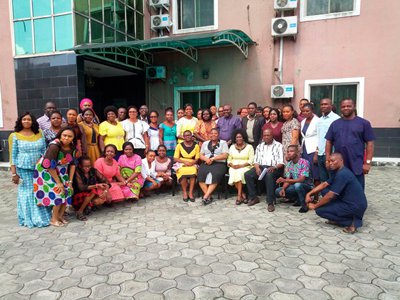To get community members to participate actively in governance, a civil society group, Kebetkache Women Development and Resource Centre, held a two-day capacity training workshop on “community needs assessment, taxation, influencing and participatory budgeting” in Port Harcourt.
Some of the communities at the seminar are Khana, Gokana, Eleme, Tai, Ahoada East, Andoni as well as Ogu/Bolo. Other CSOs were equally in attendance. The programme was sponsored by Dutch embassy and supported by Oxfam Novib.
The Executive Director of the group, Emem Okon, disclosed that other benefitting states are Enugu, Delta and Cross Rivers.
She said: “This is the fourth in the series of the capacity building training on community men and women in Rivers state since September 2016, with over 200 persons benefiting.”
Represented by Nelly Umoren, Okon said the workshop was meant to empower and encourage community dwellers to participate actively in government yearly budgets, noting that it was a livelihood, community needs assessment and shadow budgeting enlightenment workshop, whose results cannot be overemphasized.
“It is expected that the project at the long run would impact on, empower more women in Nigeria to participate in decision-making processes in the country, with the view of contributing meaningfully in Marion building and also benefit from better living standards through increased availability of petroleum essential services.
“The partway to change has been planned at five various levels- improved government policies, improved private sector policies, strengthened Civil Society Organisations(CSOs), increased citizens’ voice as well as building wider and stronger alliances,” she noted.
Ms Okon explained that Kebetkache’s interest borders on increasing the voice of citizens in the demand for fairness in taxation policies and implementation, and budget participation for enhanced transparency and accountability.
According to her, the concept of the seminar is to ensure community involvement in the process of budgeting for inclusive community needs in the state’s fiscal year plan.
“Therefore, Oxfam and her partners by this project are encouraging all of you who are carefully selected for the budget implementation training are expected at the end to among other things, take action to demand fair taxation practices and/ or take up a state government budget document to identify projects budgeted for your community and monitor and confirm if they have been implemented, this is the kind of participation in governance that promotes accountability,” she urged them.
Speaking to the Niger Delta Report shortly, participants lauded the efforts of CSOs in educating and enlightening members of the public especially, rural women on the need for active participation in governance.
The Permanent Secretary, Ministry of Budget, Mrs Titilola Kalio, who represented the commissioner in the ministry, Isaac Kamalu, said: “Kebetkache has tried in trying to support the efforts of government in this area, especially by trying to educate the participants on the need and how to prioritize their numerous needs in the face of very meagre funds, resources, and using it to educate them on how to present their communities need assessment for inclusion in the governments yearly budget, bearing in mind that as their many personal, fantastic needs are chasing after small resources in their homes so is the government battling with several state needs with meagre budget, hence the need for need assessment.
“This is also why the government in harping on the fact that the days of oil boom is over, the days when government used to run deficit and administration, when it used to say that the problem is not money, but what to spend it on, the oil price fall in the international oil market has made it difficult for a country like Nigeria that is running on just oil money to have all the money they need to spend on just anything, so any project of the government to communities now must be projects of priority need to the people.”
She urged women to take advantage of the various government town hall meetings and others to articulate the pressing needs of their areas at every given time for inclusion in the state budget for possible implementation.
Also speaking, a Director in the state Ministry of women affairs, Dr Carmelita Abrobere, assured that the issues raised in the workshop were realistic should the women stand up to their responsibilities in the country.
“All that they have discussed are budgeting, neutrality, reduced taxation and that doing things right is achievable in the country. Often time rural women approach the ministry to request for one thing or the other, if these requests come during the budget call letter we include those requests into the ministries budgets for the year, but if they came after, we have a notebook in my office where we document all requests made to us, it is from the documented record we draw the next budget from, bringing in the pending need requests first into the budget proposal of the ministry for the particular fiscal year,” she stated.
One of the community women, Syndia Amadi, expressed gratitude to the group for the opportunity to know what their rights in budget passage and also how government yearly budgets were generated and passed for implementation.




